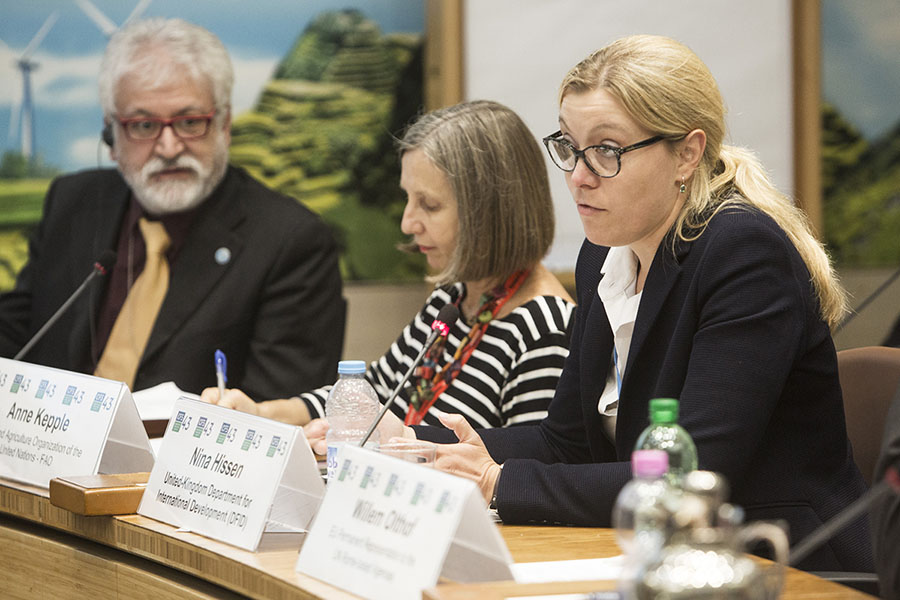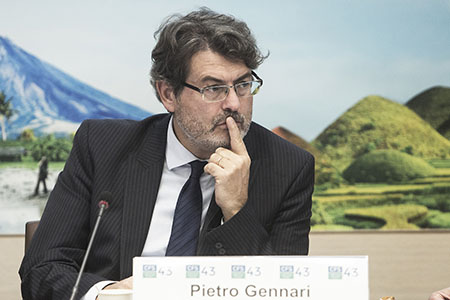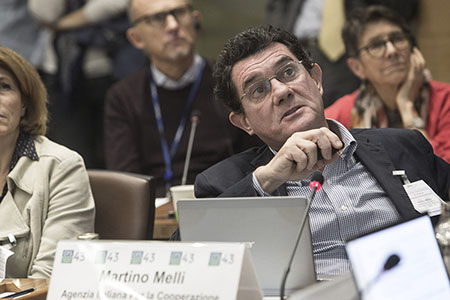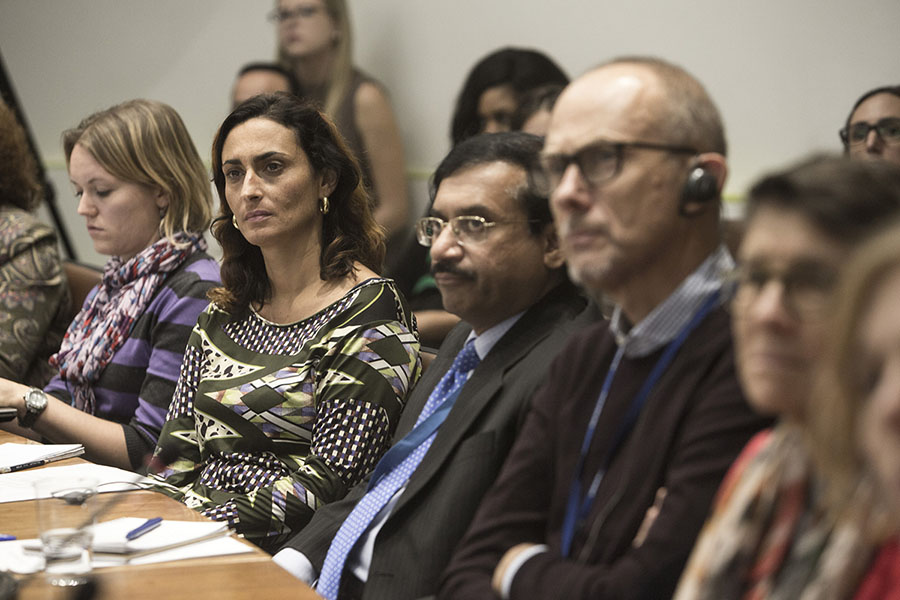Summary
The following side events were covered by ENBOTS on Thursday, 20 October 2016:
- Carpe Diem! Addressing the Nexus – Water, Energy, Food & Ecosystems – For #zerohunger in Africa
- The Challenges of Monitoring Hunger and Food Insecurity in the Context of the 2030 Sustainable Development Agenda
IISD Reporting Services, through its ENB+ Meeting Coverage, has provided web coverage of CFS 43 and selected side-events. The summary report of CFS 43 is available in HTML and PDF.
Carpe Diem! Addressing the Nexus – Water, Energy, Food & Ecosystems – For #zerohunger in Africa
Organized by the African Union, Global Water Partnership (GWP), International Water Management Institute.
This side event, chaired by Ambassador Godfrey Magwenzi, Permanent Representative of Zimbabwe to FAO, illustrated how work done at the global level by CFS on the water, energy and food nexus to address food security and nutrition challenges can be applied at the country or local level through a partnership approach. Magwenzi noted that poor rainfall, degraded ecosystems and poor water management were challenges facing Zimbabwe, as well as many countries in Africa, but that they were being addressed through a multistakeholder approach that included the ministries of water and agriculture, civil society and NGOs. He added that the process identified several priorities, such as the need to raise more awareness on water conservation and develop long-term water policies.
Laila Lokosang, African Union (AU), highlighted the work of the AU’s Comprehensive Africa Agriculture Development Programme, which includes a focus on increasing food supply, reducing hunger, and improving responses to food emergency crises. He stressed the interconnectedness of water, energy, food and ecosystem issues and that they should addressed together to ensure food security in Africa.
Abel Afouda, Global Water Partnership, stressed the need for a more integrated approach between water and food security, highlighting a multistakeholder initiative that has identified water and food security priorities in nine African countries (Benin, Burkina Faso, Ethiopia, Lesotho, Malawi, Mali, Nigeria, Sudan, Uganda). He said the aim is to support governments in addressing the challenge of managing water and food security in an integrated holistic manner, and to contribute towards SDG2 to end hunger, achieve food security and improved nutrition, and promote sustainable agriculture.
Tim Williams, International Water Management Institute (IWMI), said there is a good understanding today of the water, food and security nexus, but it is also important to include the ecosystem element. When addressing the nine-country initiative, he said stakeholders need to look at irrigation as an ecosystem activity as it has environmental and food security consequences. He also said that practical policies need to integrate ecosystems management into water resource management.
Olcar Unver, FAO, introduced the FAO’s approach to the water-energy-food nexus, which provides a framework to address food security and sustainable agriculture. He said the nexus approach can help identify and manage trade-offs and to build synergies, allowing for more integrated and cost-effective planning, decision-making, implementation, monitoring and evaluation. He announced a new FAO initiative, Coping with Water Scarcity in Agriculture, which will be launched at the UN climate change meeting in Morocco, with the aim of bringing together knowledge and investment partners to address food security within the framework of water scarcity.
In discussions, participants considered, inter alia, the buy-in of smallholder famers, the effects of urbanization on water use, competing water demands and climate change, and the use of waste water as a resource.
Contacts:
-
Manuel Fulchiron, GWP, manuel.fulchiron@gwp.org
Laila Lokosang, African Union, lokosang@africa-untion.org
Amare Haileslassie, IWMI, a.haileslassie@cgiar.org
More Information:
The Challenges of Monitoring Hunger and Food Insecurity in the Context of the 2030 Sustainable Development Agenda
Organized by Agenzia Italiana per la Cooperazione allo Sviluppo (AICS), EU Delegation to the UN Organizations in Rome, UK Department for International Development (DFID), FAO.
This side event, moderated by Anne Kepple, FAO, provided an opportunity for policy-makers to discuss the challenges and opportunities for strengthening policy-making in the area of food security and nutrition at national and international levels, and within the context of the SDGs.
Pietro Gennari, FAO, provided an overview of FAO’s approach to help countries step up capacity to monitor SDGs, especially with regards to food security and nutrition. With 169 targets and 230 global indicators – five targets alone for SDG2 – he said monitoring indicators are a demanding task for many countries that lack statistical capacity. He stressed, therefore, the need for new, timely, reliable and granular data to be collected through a more holistic approach. He added that the responsibility for generating data to inform the global indicators rests with national institutions, but there are global tools, such as FAO’s Food Insecurity Experience Scale (FIES), which has the potential to contribute to a more comprehensive understanding of the causes and consequences of food insecurity and to inform more effective policies and interventions.
Jean-Pierre Halkin, European Commission Directorate-General for International Cooperation and Development (DEVCO), stressed the importance of development assistance in tackling food security and sustainable agriculture, and support for the SDGs, especially SDG2, which calls on stakeholders to end hunger, achieve food security and improved nutrition, and promote sustainable agriculture. He noted the importance of making sure countries adopt SDG targets and the right policies to reach these targets. Access to data, he said, would help track progress, and having the right evidence would help countries meet their targets.
Martino Melli, AICS, said good statistical systems are key for effective economic and social development and are an essential tool to meet the challenge of achieving the SDGs. He added that data and statistics deserve increased attention in the development context, adding that they are recognized in SDG17. Melli called for a data revolution and identified four strategic priorities to produce, analyze and use effective statistical data: civil registration and vital statistics systems; partnerships for development; optimal use of financial, human and technological resources; and new technologies and innovative methods of collecting and analyzing data.
Nina Hissen and Vincent Gainey, DFID, presented on the future of the FIES and how it can be embedded in national institutions. They said the FIES -- consisting of eight short questions that focuses on self-reported, food-related behaviors and experiences associated with increasing difficulties in accessing food due to resource constraints – is an important tool for national institutions to use and translate the statistical information into policy actions to improve food security. They added that it is important to help countries build national statistical capacity while ensuring quality, consistency and maintaining global coherence. National ownership of the process is key, they said, with a strong role for an international body, like the FAO, to oversee national data collection.
In discussions, participants considered, inter alia: the importance of engaging civil society and youth in data collection; broadening the scope of the system to possibly include a nutritional dimension; using social media to collect responses for the FIES survey; and applying the FIES to both developed and developing countries.
L.:-R.: Carlo Cafiero, FAO; Anne Kepple, FAO; Nina Hissen, Department for International Development (DFID), UK
©FAO/Alessandra Benedetti
Pietro Gennari, FAO
©FAO/Alessandra Benedetti
Martino Melli, Agenzia Italiana per la Cooperazione allo Sviluppo (AICS)
©FAO/Alessandra Benedetti
©FAO/Alessandra Benedetti
Contacts:
-
Aymeric Songy, FAO, amyeric.songy@fao.org
More Information:
-
http://www.fao.org
https://www.gov.uk/government/organisations/department-for-international-development
http://ec.europa.eu/europeaid/general_en
http://www.agenziacooperazione.gov.it



